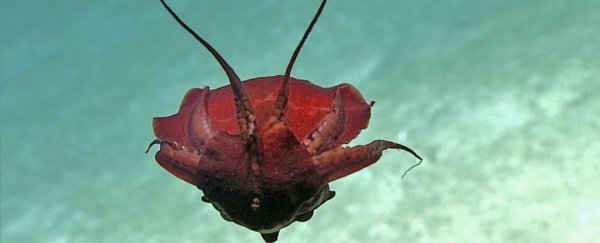Squids are some of the most uncanny ocean animals we see. They're twisty, and strange, and have cephalopod cunning. And now marine biologists have found a squid unlike any they've seen before.
The crew of the NOAA's research vessel Okeanos Explorer spotted the creature deep under the waves of the Gulf of Mexico, in the mesopelagic zone at a depth of around 850 metres (2,790 feet).
It was coasting along in a highly unusual pose, its tentacles folded back in what resembled a defensive posture, but to an extreme degree - so that it looked almost completely unlike a squid at all.
"My first reaction was, 'What in the hell was that?'," NOAA biologist Mike Vecchione told National Geographic.
"It didn't look like any squid I had seen, until we started getting close and the animal started rotating around."
Its manner of swimming resembled a nautilus, and its colouring resembled that of a vampire squid (neither a vampire, nor actually a squid), but the researchers believe it may be a mysterious squid called Discoteuthis discus, which is only known from dead, incomplete specimens.
However, because the researchers didn't collect the squid, for now they only have the footage. They don't know what the squid eats, or how it gets its food; or the reason for its really weird posture - whether it was camouflage, a sign of illness, a way to optimise food collection of debris falling through the ocean, or something else.
Other squids have been observed in a similar posture, but this squid was different.
"This one was real extreme," Vecchione said. "A couple of the arms were folded right flat on the back, and a couple were folded underneath, and a couple were sticking out to the side."
Future dives may reveal more information about its behaviour and characteristics and help identify the squid - whether it's a species already known to science behaving really oddly, or something completely new.
Meanwhile, for more strange and amazing ocean creatures, like this spooky li'l octopus, this ethereal jellyfish, or this bioluminescent beastie, you can sign up to follow the Okeanos Explorer's Youtube channel.
